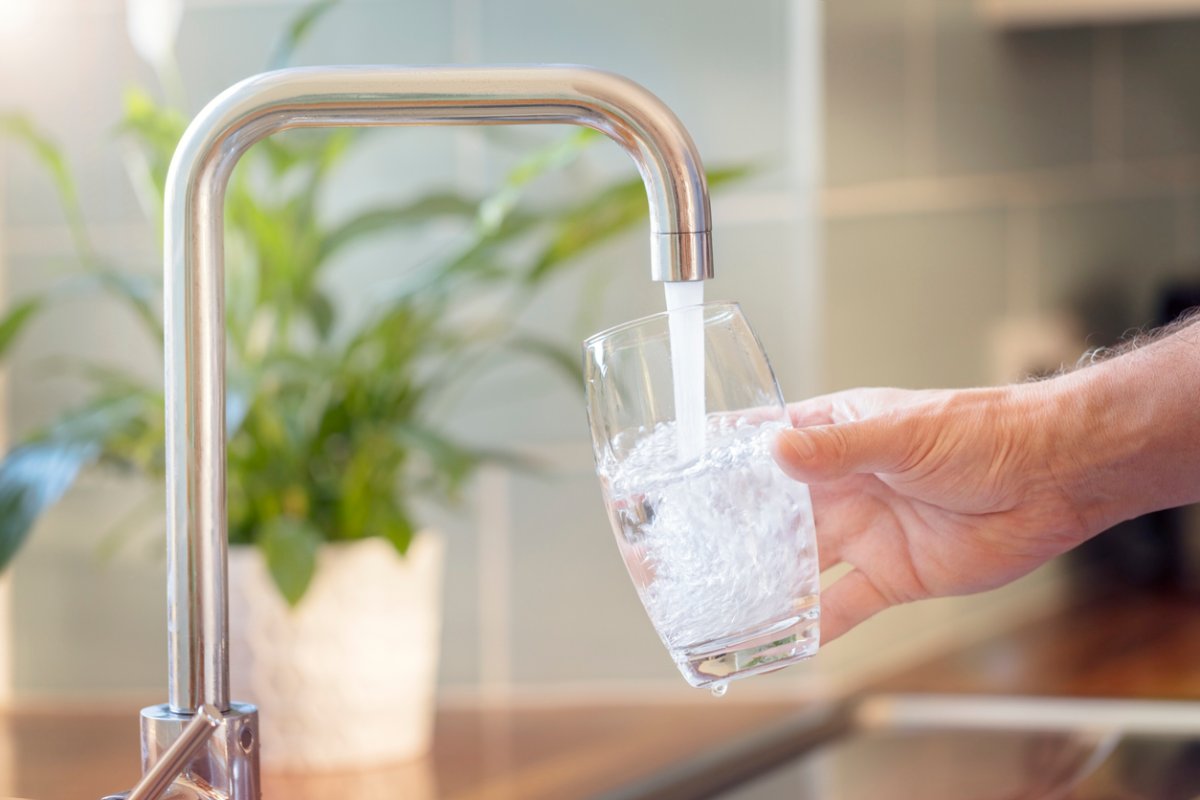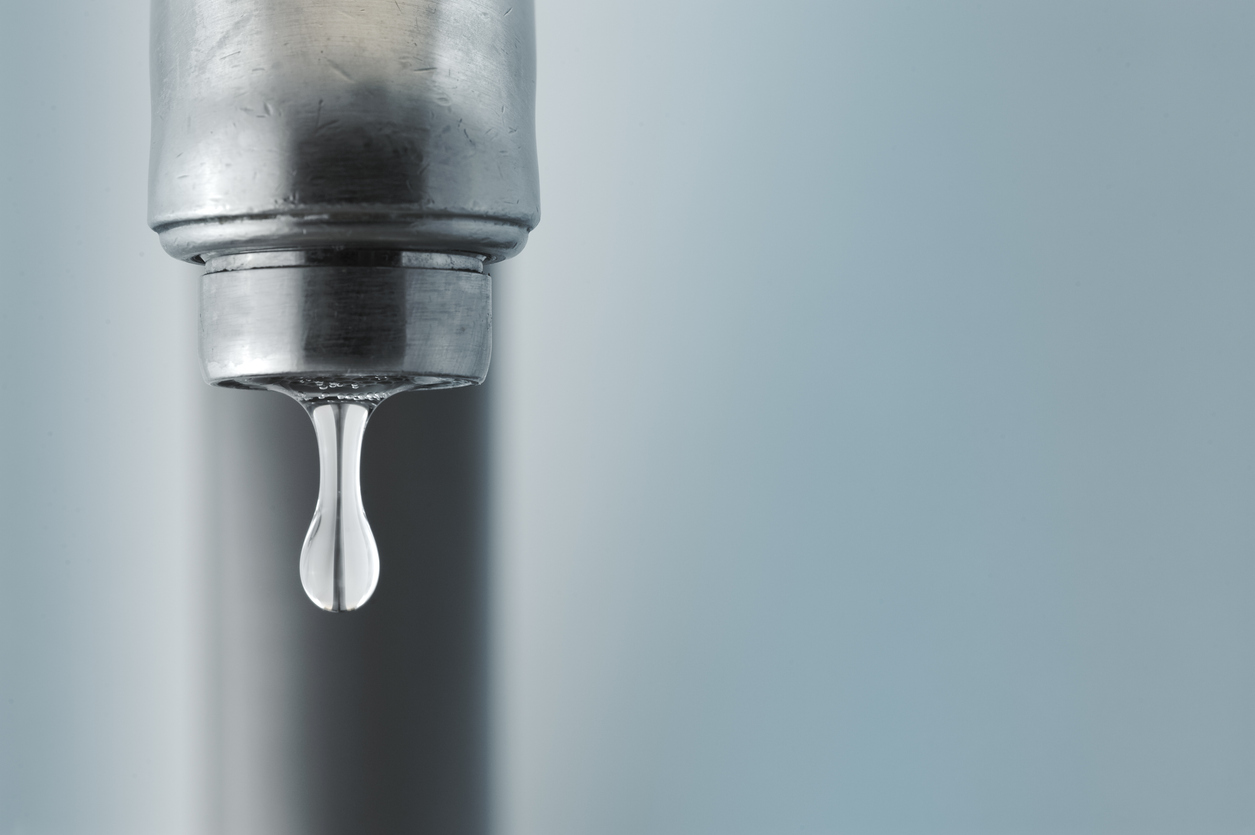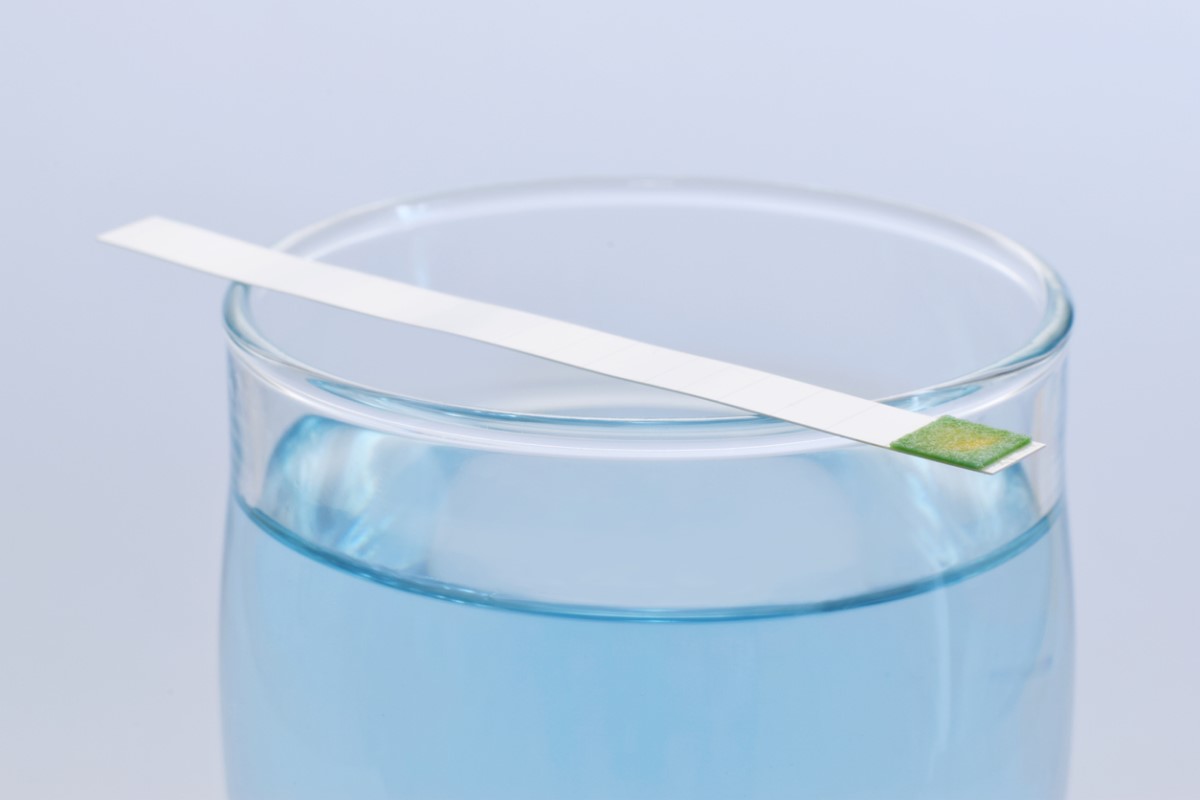

We may earn revenue from the products available on this page and participate in affiliate programs. Learn More ›
Low water pressure, discolored laundry, soap scum build-up on your sinks, dry skin after your bath. All these are signs that your home is suffering from hard water. These issues occur when your water has high mineral content, typically from lime, magnesium and calcium. While these minerals are safe to ingest (many are actually good for you), they can wreak havoc on your plumbing and laundry. Hard water clogs your plumbing fixtures, shortens the life of your appliances, and prevents laundry detergent from doing its job. Those minerals can even take their toll on you physically, leaving your skin dry and hair dull.
Ahead, we’ll break down all the signs of hard water and how to tell when it’s time to test your home’s water hardness before covering what options you have for fixing the problem.
Common Signs of Hard Water
Identifying whether the problem is hard water or merely a faulty dishwasher, washing machine or failing water supply line can be tricky. Fortunately, hard water leaves telltale signs throughout your kitchen and bathrooms that are easy to identify.
There’s mineral buildup around your faucets.
“The most obvious signs of hard water in a home would be mineral build-up, which can show up on plumbing fixtures and the surrounding walls, floors, and sinks,” says Mike Sale, Home Water Systems Expert and Certified Water Sommelier for Indianapolis-based Delta Faucet. As the water dries, it leaves crusty, whitish mineral deposits that can be difficult to scrub away, and over time, heavy deposits can form.
To help prevent buildup, dry the sink with a towel after use, paying special attention to the area around faucets and drains. To remove existing buildup, use a cleaner made to dissolve hard water deposits, such as Calcium, Lime, and Rust Remover.
You’re frequently scrubbing soap scum from your shower.
Hard water has a hard time dissolving shampoo and soap as well as laundry detergent, so these bathing basics tend to stick to tile and porcelain surfaces rather than rinse away. The result is a scummy residue inside the shower that dulls the walls and coats the door with a thick film.
To make cleanup easier, spritz the inside of your shower immediately after use with a daily shower cleaner, such as Method’s Eucalyptus Mint Daily Shower Spray. This type of cleaner helps break down and dissolve soap and shampoo residue so it goes down the drain.
Your skin feels dry and itchy and your hair lacks luster.
Not only does hard water leave your shower walls coated in soap scum, but it also leaves the same residue on your body. “Your skin can get dry and itchy after a shower, and your hair might feel kind of stiff or dull,” says Al Fagundes, the founder and CEO of Tyngsborough, Massachusetts-based A. Fagundes Plumbing & Heating. While switching to hypoallergenic body wash and shampoo may reduce some itchiness and irritation, the best solution is a water softener.
Your glasses are stained with cloudy spots or film.
Hard water droplets dry to an opaque finish that can leave spots or a cloudy film on glassware. If you use a dishwasher, adding a rinse agent such as Finish Jet-Dry Rinse Aid can help water droplets run off the glasses, but it’s not a cure-all. For clean, clear glasses, wash them by hand and dry with a dishtowel.
Your appliances aren’t working as well as they used to.

Any appliance that uses water—a washing machine, dishwasher, or water heater—won’t last as long as it should in a house with hard water. “Scale (from hard water) sticks to heating elements and other parts, making the appliance work harder and less efficiently,” Fagundes says. “I’ve opened up water heaters with inches of scale at the bottom, like a layer of rock. It cuts down on efficiency and can even shorten the life of the appliance by years.”
You have slow-running faucets in your home.

While weak water pressure can be due to a number of factors, such as a water meter shut-off value that’s not completely open, slow-running water in conjunction with other hard water problems listed here could mean mineral deposits in the water supply lines are blocking the water flow.
“As the minerals build up, they can cause clogs in fixtures, affecting the flow rate and functionality,” Sale says.
Installing a water softener will prevent further mineral buildup in the lines. The only way to restore full water pressure, however, is to replace the lines, which is a major plumbing project.
Your water has a funny taste.
While the calcium and magnesium in hard water is actually good for you, that doesn’t mean they make water taste good. Sale says an excessive amount of minerals can leave water, tea, and coffee tasting chalky. Hard water can also make foods you cook in water, such as pasta and vegetables, tougher and chewier. One solution is to filter the water, but Sale warns against getting carried away with the filtering. “There’s a sweet spot of low minerality that produces a generally preferred taste profile that is also ideal for cooking, coffee, and tea,” he says.
When You Should Conduct a Hard Water Test

The only definitive way to determine if your home has hard water is to purchase a hard water test kit.
If you’re experiencing the following issues with your water, it’s time to invest in one.
- You have noticeable residue building up on showers, baths, and sinks.
- You and other members of your family are complaining of dry skin and hair.
- Your neighbors are also experiencing hard water problems.
- When you bathe, the shampoo and soap don’t suds up.
- Your glasses and dishware have noticeable spots and water marks after going through the dishwasher.
- The aerators in your faucets easily clog.
- You notice a lack of water pressure in several faucets in your home.
- Your dishwasher and clothes washer aren’t doing their jobs very well.
The simplest way to confirm your suspicion is with hard water test strips, such as the JNW Direct Total Hardness Test Strip Kit. This specific kit comes with 150 strips, and testing is as easy as dipping the tip of the strip in the water and then comparing the color of the strip to the color chart on the side of the bottle.
Water hardness is measured in either grains per gallon (GPG) or parts per million (PPM). Anything over three GPG or 50 PPM is considered hard water. The test strips can be used to test regular tap water, filtered water, or water that’s being treated by a water softening system.
What to Do if Your Home Has Hard Water
Just because your hard water test came back positive doesn’t mean you have to suffer through itchy skin, lifeless hair, hazy glassware, and poor water pressure. Though you’ll need to invest some money in a fix for this issue, there are affordable solutions to your home’s hard water problems, some of which you can even install yourself.
Install a water softener to address your hard water issue.
Water softeners, such as the Whirlpool 40,000-grain water softener, install on the main water supply line that enters the house. Water softeners work by removing mineral ions and replacing them with sodium ions.
The sodium helps soap dissolve completely so it rinses away with ease; laundry gets cleaner and tubs and showers don’t require as much scrubbing. Softer water also helps prolong the life of appliances, pipes, and drains because it doesn’t result in mineral buildup or deposits.
Hire a plumber to install your water softener.
If the house has an old water softener that stopped working, a handy homeowner can often replace it with a new one—using the same connections. If the home has never had a water softener, however, you’ll need to hire a plumber to cut the existing lines and install new connections for a water softener.
Final Thoughts
The first step to fixing hard water is to first confirm it’s the problem. Luckily, this doesn’t involve calling in an expensive professional. By examining how your home’s water is impacting your dishware, bathtubs, and faucets, and observing signs of hard water on hair and skin, you can determine if hard water is the culprit.
Simple and inexpensive soap sud or hardness test strip kits are also handy for assessing the condition of your home’s water. Once you know how to tell if you have hard water, you can then take measures to soften it.
FAQs
There are no serious health hazards caused by drinking hard water, which is why cities often won’t invest in softening water. That said, hard water can cause dry skin and hair.
Hard water sometimes has a chemical taste, which is the result of a high level of dissolved minerals residing in what is considered hard water.
Vinegar contains small amounts of potassium and chloride, two chemicals that soften hard water by dissolving minerals.
Yes. Minerals such as calcium and magnesium, which make water hard, are essential minerals that help to fulfill your body’s daily dietary needs. In fact, hard water has actually been linked to lowering the risk for heart disease.
Check with your neighbors to see if they’re experiencing hard water issues. If you’re on city water, you might also call the city water department, which can tell you if the area has hard water. City water treatment plants typically don’t soften water to optimal levels due to the expense of treating so much water.
